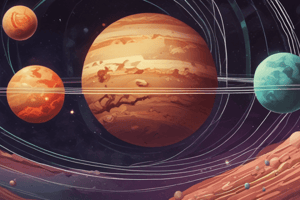Podcast
Questions and Answers
Match the planet with its Equatorial Radius (km):
Match the planet with its Equatorial Radius (km):
Mercury = 2,439.70 Venus = 6,051.80 Earth = 6,371.00 Mars = 3,389.50
Match the planet with its Density (g/cm3):
Match the planet with its Density (g/cm3):
Jupiter = 1.33 Saturn = 0.69 Uranus = 1.27 Neptune = 1.64
Match the planet with its Rotation Period (Earth Days):
Match the planet with its Rotation Period (Earth Days):
Mercury = 58.646 Venus = 243.018 Earth = 0.997 Mars = 1.026
Match the planet with its Orbit Period (Earth Years):
Match the planet with its Orbit Period (Earth Years):
Match the planet with whether it has a Solid Surface:
Match the planet with whether it has a Solid Surface:
Match the planet with its number of Moons:
Match the planet with its number of Moons:
Flashcards are hidden until you start studying
Study Notes
Planet Information Summary
Equatorial Radius
- Mercury: 2,439.70 km
- Venus: 6,051.80 km
- Earth: 6,371.00 km
- Mars: 3,389.50 km
- Jupiter: 69,911.00 km
- Saturn: 58,232.00 km
- Uranus: 25,362.00 km
- Neptune: 24,622.00 km
Density
- Mercury: 5.43 g/cm³
- Venus: 5.24 g/cm³
- Earth: 5.51 g/cm³
- Mars: 3.93 g/cm³
- Jupiter: 1.33 g/cm³
- Saturn: 0.69 g/cm³
- Uranus: 1.27 g/cm³
- Neptune: 1.64 g/cm³
Rotation Period
- Mercury: 58.646 Earth days
- Venus: 243.018 Earth days
- Earth: 0.997 Earth days
- Mars: 1.026 Earth days
- Jupiter: 0.414 Earth days
- Saturn: 0.444 Earth days
- Uranus: 0.718 Earth days
- Neptune: 0.671 Earth days
Orbit Period
- Mercury: 0.24 Earth years
- Venus: 0.62 Earth years
- Earth: 1.00 Earth years
- Mars: 1.88 Earth years
- Jupiter: 11.86 Earth years
- Saturn: 29.45 Earth years
- Uranus: 84.02 Earth years
- Neptune: 164.79 Earth years
Solid Surface and Atmosphere
- Mercury: Yes, with atmosphere components O2, Na, H2
- Venus: Yes, with atmosphere components He, K
- Earth: Yes, with atmosphere components N2, O2, Ar
- Mars: Yes, with atmosphere components CO2
- Jupiter: No, with atmosphere components H2, He
- Saturn: No, with atmosphere components H2, He
- Uranus: No, with atmosphere components CH4
- Neptune: No, with atmosphere components H2, He, CH4
Moons and Rings
- Mercury: 0 moons, no rings
- Venus: 0 moons, no rings
- Earth: 1 moon, no rings
- Mars: 2 moons, no rings
- Jupiter: 95 moons, yes rings
- Saturn: 146 moons, yes rings
- Uranus: 28 moons, yes rings
- Neptune: 14 moons, yes rings
Mean Temperature
- Mercury: 333°F (167°C)
- Venus: -85°F (-65°C)
- Earth: -166°F (-110°C)
- Mars: -220°F (-140°C)
- Jupiter: -320°F (-195°C)
- Saturn: -330°F (-200°C)
Notable Explorations
- Mercury: Messenger
- Venus: Mariner 4, Venera 7
- Earth: ISS
- Mars: Mars orbiter, Mariner 4, Viking 1 and 2, Pioneer 10 and 11, Spirit and Opportunity
Studying That Suits You
Use AI to generate personalized quizzes and flashcards to suit your learning preferences.




